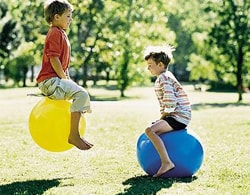If you want your child to not be nearsighted, take him outside.
Playing outdoors regularly may significantly reduce the risk of nearsightedness in adolescence, a study has revealed. Previous studies have found that spending time outdoors is good for the eyes, but it has not been proven whether this is due to exercise or exposure to light.
Playing outdoors regularly may significantly reduce the risk of nearsightedness in adolescence, a study has revealed. Previous studies have found that spending time outdoors is good for the eyes, but it has not been proven whether this is due to exercise or exposure to light.
Dr Cathy Williams, from the University of Bristol (UK), said the recent research is the first direct evidence of the benefits of natural light for human eyes.

Playing outdoors helps children avoid myopia. Photo: Telegraph.
It found a strong link between time outdoors and good eyesight, regardless of family history, how much time a child spent reading or whether they ran or ran.
The team looked at the eye test results of 7,000 children in southwest England, at the ages of 7, 10, 11, 12 and 15. They also monitored the children's movements over a week.
As a result, children who regularly played outdoors at age 8 or 9 were only half as likely to be nearsighted by age 15 as children who spent less time outdoors.
"We're still not sure why being outdoors is so good for children's eyes, but given the benefits, we should encourage children to spend more time outside, while still avoiding too much UV exposure," Dr. Williams told the journal Investigative Ophthalmology & Visual Science.
Between a quarter and half of young people in the West and up to 80% of young people in Southeast Asia are affected by myopia. More than a third of adults with myopia need glasses to see clearly in the distance – a figure that has doubled over the past 30 years.
Last year, a British study also confirmed the effect of sunlight in reducing myopia in children.
According to Vnexpress - nt






